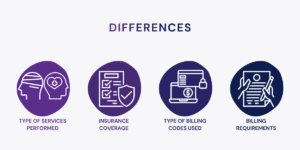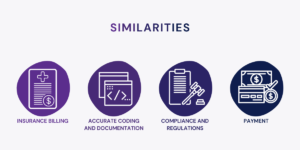Blog

Table of Contents
Healthcare billing is the process of submitting and following up on insurance claims to receive payment for medical services provided to patients. Healthcare providers, such as hospitals, clinics, and doctors’ offices, use billing codes to indicate the specific medical procedures and services provided to the patient. These codes are then submitted to the patient’s insurance company, which will either approve or deny the claim based on their coverage policies.
This type of billing can be complex, with different insurance companies and government programs having their own rules and regulations. Healthcare providers need to stay up-to-date on these requirements to ensure timely and accurate payment for the services they provide. Additionally, patients should review their medical bills carefully and ask questions if they notice any discrepancies or have concerns about their coverage.
In this blog, we will talk about medical billing for ambulatory surgery and behavioral health centers and the differences and similarities between the two. Let’s get a brief introduction of both medical terms and detailed information about their billing type.
Medical Billing For Ambulatory Surgery Centers
Also known as an outpatient or same-day surgery, ambulatory surgery is a surgical procedure performed in a hospital or surgical center where the patient is admitted and discharged on the same day. The patient does not stay overnight in the hospital but returns home shortly after the surgery.
Ambulatory surgery billing refers to the process of submitting and processing insurance claims for surgical procedures that are performed on an outpatient basis. This process involves verifying insurance coverage and eligibility, obtaining pre-authorization, coding the procedure with the appropriate billing codes, submitting claims for reimbursement, and managing the payment and collections process.
Accurate and efficient ambulatory surgery billing is critical for surgical centers and clinics to receive proper reimbursement for their services and to maintain financial sustainability in the increasingly complex healthcare landscape. Ambulatory surgery billing also requires knowledge of the various billing codes and regulations that govern the healthcare industry.
Medical Billing For Behavioral Health Centers
Behavioral health refers to the scientific study of individuals’ behaviors, emotions, and mental health, as well as the prevention, diagnosis, and treatment of mental illnesses, behavioral disorders, and substance abuse.
Behavioral health billing refers to submitting and processing insurance claims for mental health and substance abuse services. This includes services provided by psychiatrists, psychologists, therapists, social workers, and other mental health professionals.
This type of billing typically involves verifying insurance coverage and eligibility, submitting claims for reimbursement, and managing the payment and collections process. It also requires knowledge of the various billing codes and regulations that govern the behavioral health industry.
Accurate and efficient behavioral health billing is critical for mental health providers and facilities to receive proper reimbursement for their services and to maintain financial sustainability in the increasingly complex healthcare landscape.
Differences & Similarities
Ambulatory surgery and behavioral health billing are two distinct healthcare billing areas, but they share some similarities. Here are some differences and similarities between the two:
Differences:

- Nature of services: Ambulatory surgery billing concerns surgical procedures that do not require an overnight hospital stay. In contrast, behavioral health billing relates to mental health and substance abuse services, sometimes involving inpatient programs.
- Insurance coverage: Insurance coverage for ambulatory surgery and behavioral health services may differ, with behavioral health services sometimes being subject to more limitations and restrictions.
- Billing codes: The billing codes used for ambulatory surgery and behavioral health services are different, with ambulatory surgery billing codes typically falling under the surgical procedure codes, while behavioral health billing codes fall under the mental health and substance abuse codes.
- Billing requirements: Billing requirements for ambulatory surgery and behavioral health services may differ, with behavioral health services often requiring more detailed documentation and justification.
Similarities:

- Insurance billing: Ambulatory surgery and behavioral health billing involve submitting claims to insurance companies to reimburse services provided.
- Coding: Both areas require accurate coding and documentation of services provided to bill accurately.
- Compliance: Both areas require compliance with federal and state regulations related to billing and reimbursement for services provided.
- Payment: Both areas require payment to be received on time for services provided.
While there are some key differences between ambulatory surgery and behavioral health billing, there are similarities in insurance billing, coding, compliance, and payment. Healthcare billing professionals need to be familiar with both areas to provide accurate and timely billing services.
Hansei Solutions and the Medical Billing
Hansei Solutions is passionate about revolutionizing the medical billing process for ambulatory surgery centers and behavioral health facilities. With our expertise, we can assist you in collecting and saving valuable data, enabling you to make more informed decisions for the growth and success of your business. With our years of experience in providing top-notch customer service, we know what it takes to build a thriving business. Contact us now to schedule a demo and learn more about what we offer.

Ready to focus on providing healthcare? Let us lighten your load.
We’re here to address your pain points and create growth opportunities for your organization. We’re passionate about what we do, and it shows in every interaction. Learn what makes us tick and schedule a demo today.